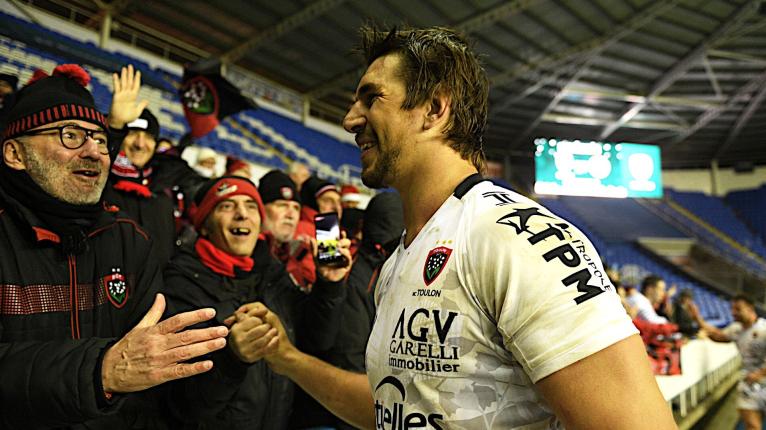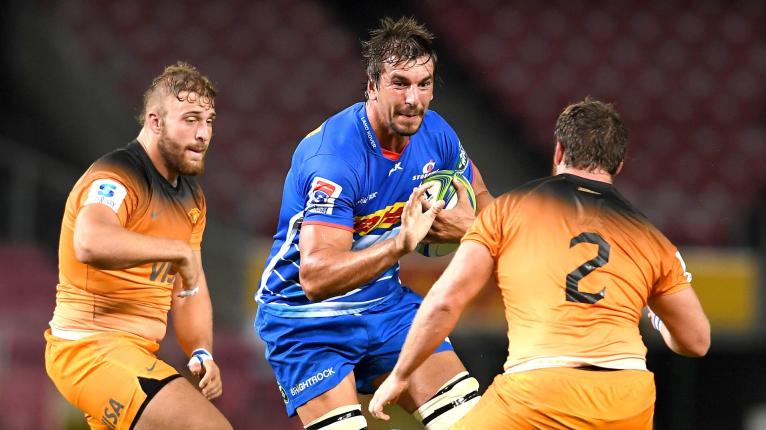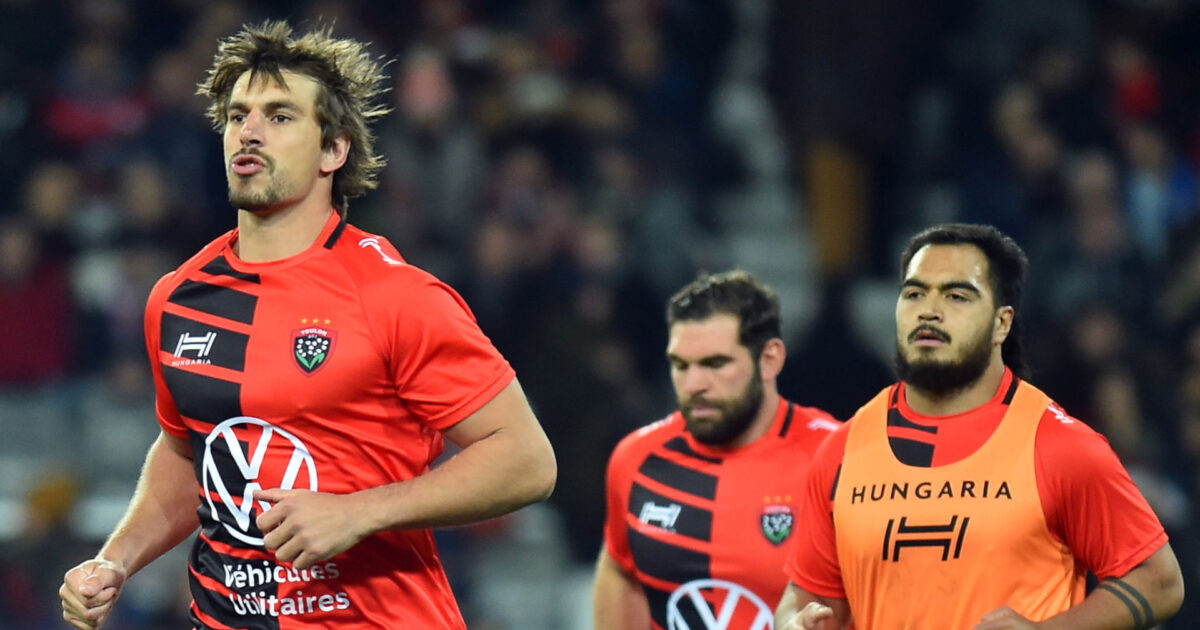'I've read somewhere that I can curl 80kg; I'm not sure anyone alive can do that. But the truth is...'' - Etzebeth

There is a great Eben Etzebeth fable, enshrined in rugby legend, that feeds the narrative of physical freakery and rampant aggression inexorably attached to the giant lock.
The story goes that as a pup at the Stormers, the franchise didn’t have dumbbells heavy enough to tax him. Their largest set of weights was simply too light. Like fishermen boasting about the record-breaking carp they coulda-woulda-shoulda landed, the internet is awash with tales of the insane volume of tin that Etzebeth supposedly throws around.
“I’ve read somewhere that I can curl 80kg; I’m not sure anyone alive can do that,” he told RugbyPass. “But the truth is, back in 2012 I was starting out with the Stormers in pre-season and me and Steven Kitshoff – another really strong guy in the gym – were doing bench presses with dumbbells.
“The biggest dumbbells the Stormers had were 65kg. We were repping 65kg and we thought, let’s try something different, so we went to the physio room, took two 5kg plates and strapped one on each side. The conditioner saw that and ordered us in the 70kgs and 75kgs. Since then, I’ve had shoulder injuries and ACL damage, so I definitely can’t lift that anymore.”
So, the legend has frightening basis in fact. A mere 75kg – that’s almost equivalent to hoisting a Conor McGregor in each arm. The comical size difference between the monstrous Springbok and the deadly UFC fighter was illustrated recently when the pair met, dined and posed for a photograph on the gorgeous French island of Corsica.
View this post on Instagram
What a privilege to meet @thenotoriousmma and having a Sunday braai! #legend #notyouraveragesunday
Etzebeth was invited to spend a weekend holidaying on the archipelago by Princess Charlene of Monaco, who was raised in South Africa. He chatted to McGregor and picked the Irishman’s brains. Life at Toulon, where he has signed a new four-year deal just nine months into his first contract, certainly has its perks.
“We had lunch, a barbecue, it was just nice to meet him, speak to him, hear what he is about and what his plans are,” said Etzebeth.
“When I met him, he was really down to earth, a family guy. It was just like you were chatting to one of your friends. You could see at any time, he was always looking where his wife and kids were. It was really nice to see.”
At the moment, the hulking second-row is recovering from a rib injury sustained in Toulon’s Top 14 opener against La Rochelle, damage that should heal in time for the Springboks’ Rugby Championship campaign.
His days on the Cote d’Azur, although heavily disrupted by Covid-19, have been exhilarating. After the briefest of spells at Toulon, Etzebeth was moved to pledge his long-term future to the club this summer, an indication of how he is revelling in his new surrounds.
But it was a conversation with Bakkies Botha, his forebear as the great enforcer of the Boks pack and a trophy-laden juggernaut at the French side, that compelled him to look overseas.

“I had been at the Stormers for eight years and I just thought it was time to move on,” said Etzebeth. “I remember back in 2014, me and Marcell Coetzee and Bakkies went for a coffee in Ireland and he told us, ‘look, if I knew what I know now, I would have gone earlier’. A lot of guys who have come this side say the same thing. I didn’t want to wait for another four or five years, come when I’m over 30, and regret not coming earlier. I initially signed for two years, but I decided to stay longer.
“It’s quite similar to the way we played with the Springboks the past few seasons. We like to scrum and maul and use the forwards, the same game plan we have with the Springboks. It is a bit slower than Super Rugby, but the physicality makes up for that. It’s just nice to experience something different, new styles of play, and I didn’t have to change too much because they’re also quite forward-dominated here in Toulon.”
Etzebeth had long been earmarked as the heir to Botha’s iron throne with his snarl, refusal to be cowed and his constant berth at the epicentre of any on-field skirmishes that might require a 6ft 8ins lock to resolve with a handful of jersey and a strong word.
He has a reputation for the belligerent, but chiefly, he is a terrific rugby player, an imperious line-out operator with ballast and speed on open prairie. At 28, though, he cringes a little when he watches clips of his younger self rag-dolling opponents and taking on all comers.

“I like to break it up – I don’t like to fight!” he laughed. “It’s probably not something you go out looking for, you just do what’s in the moment. Discipline comes into it a lot so you don’t want to cost your team a penalty or a yellow card. It always starts with aggression but you must always think with a clear head and not show any stupid aggression.
“I’ve had a lot of downtime during lockdown and I watch rugby videos on YouTube and the things they put together with me, you probably won’t get away with any of it now.”
Back in South Africa, debate rages over the future for the Boks and the national franchises. These feel like seminal days for a colossal rugby nation. Is it better to push for a revised Super Rugby format and stick with Rugby Championship, launch a souped-up Currie Cup or flit north to join the European leagues and Six Nations?
Etzebeth says South Africans frequently underestimate the calibre of northern hemisphere rugby and the fervour of its supporters.
“Definitely there is a misperception, it would be nice if they can do something like a Club World Cup, the three or four best teams of each country playing each other to see who is the best,” he said.

“One thing that surprised me when I got here is the support from the fans. In France, almost every game before the lockdown, home or away, the stadium was packed. If you look at Super Rugby, crowd attendances really went down the past few years. You always think South Africa and New Zealand are massive on support and rugby is really big, but you come to France, and every week there’s a packed stadium. That was surprising to me.”
Amid the joy, there is personal turmoil to confront. In the lead-up to South Africa’s transformative World Cup win, Etzebeth was accused of racial abuse and assault with a firearm outside a bar in the idyllic coastal resort of Langebaan. He has been cleared of any wrongdoing by an internal SA Rugby investigation, chaired by a former judge, but may yet have a case to answer in the national Equality Court. Etzebeth vehemently maintains his innocence and while he will not discuss the allegations with legal matters pending, intends to give his full and frank account at some point in the future.
On the field, the challenge now is for the world champions to raise the bar again, to embrace being the hunted rather than the hunter and renew their thirst for success. There can be no resting on laurels, particularly against a wounded and smarting New Zealand and, coronavirus notwithstanding, the cream of Britain and Ireland in less than a year.
“I know rugby is a team sport, but it is probably going to start with each individual who was involved in that victory,” said Etzebeth. “As an individual, you are going to have to make the mind shift to not just be satisfied with a World Cup victory but keep on improving, keep on playing to the best of your ability.
“I am motivated to start playing again, to keep on improving. I know it’s hard to keep on improving on a World Cup win, but there is a Lions series and another World Cup coming, there are always things to be working towards.”
The sagging dumbbell rack might have a little less weight on it these days, but the fire for new glory burns as bright as ever.

























































